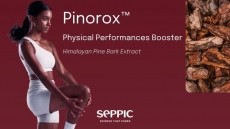Selenium plus CoQ10 may protect telomeres and reduce heart risks: Study

Significantly less shortening of telomeres was recorded after 42 months of supplementation with 200 mg per day of CoQ10 plus 200 micrograms per day of selenium, compared to a placebo group, according to analysis of data from a prospective, randomized, placebo-controlled, single-centre study with 118 elderly Swedish people with low selenium levels.
The participants were followed for a further six years after the trial ended, with the researchers finding that people who died from cardiovascular-related causes were those with shorter telomere levels.
On the other hand, “less telomere shortening during the follow-up period was associated with significantly longer survival,” wrote the researchers in Nutrients.
“To the best of our knowledge, this is the first population-based study measuring the effect of long-term intervention with combined Se and coenzyme Q10 on [leukocyte telomere length (LTL)],” wrote the researchers.
Selenium and CoQ10
Selenium is an essential micronutrient, and is considered to be an antioxidant. The mineral is included in 25 selenoproteins in the body, with diverse roles including immune support, thyroid function and healthy sperm. The issue for selenium, as for other nutrients, is that you can get too much of a good thing.
A review paper by Joyce McCann and Bruce Ames from the Nutrition and Metabolism Center at Children’s Hospital Oakland Research Institute in Oakland (CHORI) indicated that moderate deficiency in selenium may have long-term detrimental effects (FASEB Journal, 2011, Vol. 25, pp. 1793-1814).
The study was performed in Sweden where selenium intakes are low: The mean selenium level for the study population was 67 micrograms per liter of plasma, which is below the reported 90 to 140 microgram/L concentration needed for full expression of the extracellular selenoprotein P. In comparison, selenium levels in the US are not low, and mean dietary selenium intakes in the US ranging from 93 micrograms in women to 134 micrograms in men.
CoQ10 plays a vital role in the production of chemical energy in mitochondria – the 'power plants' of the cell – by participating in the production of adenosine triphosphate (ATP), the body's co-called 'energy currency'.
While the human body produces CoQ10, our ability to do this declines as we age. CoQ10 supplementation to restores age-related declines has been studied for its role in cognitive health, heart health, and anti-aging (in oral and topical formulations). It has also been shown to benefit those suffering from angina, heart attack and hypertension.
Telomeres
The aging and lifespan of normal, healthy cells are linked to the so-called telomerase shortening mechanism, which limits cells to a fixed number of divisions. During cell replication, the telomeres function by ensuring the cell's chromosomes do not fuse with each other or rearrange, which can lead to cancer.
Elizabeth Blackburn, a telomere pioneer at the University of California San Francisco, likened telomeres to the ends of shoelaces, without which the lace would unravel.
With each replication the telomeres shorten, and when the telomeres are totally consumed, the cells are destroyed (apoptosis). Previous studies have also reported that telomeres are highly susceptible to oxidative stress and inflammation. Some experts have noted that telomere length may be a marker of biological aging.
Commenting independently on the research, Mark Miller, PhD, from Kaiviti Consulting, LLC, told NutraIngredients-USA: “Oxidative stress is a well-known agent to cause telomere shortening, but the irony is that it depends on the magnitude of the stress, as well as duration. Slow, simmering chronic inflammation and its hallmark driver, oxidative stress, falls into this picture.
“Certainly, this pertains to cardiovascular disease, where atherosclerosis is sustained by chronic oxidative stress. In concert, cardiovascular disease status is associated with reduced longevity and reduced telomere length,” said Dr Miller.
“To modify these events, this interventional study used supplemental selenium, a critical component in the enzymatic degradation of hydrogen peroxide - a key signaling molecule, and CoQ10, an essential component limiting oxidative stress from the electron transport chain of mitochondria.
“This intervention resulted in a congruent improvement in telomere length, and a reduced incidence of cardiovascular mortality. This suggests that supplementation with selenium and CoQ10 could offer significant impact on the societal burden of cardiovascular disease.”
Study details
The new telomere analysis included data from 118 participants of a larger clinical trial, with telomere length quantified at the start of the study and again after 42 months of supplementation. The original study involved 443 healthy elderly participants randomly assigned to receive either placebo or daily supplements containing CoQ10 capsules (200 mg/day, Bio-Quinon 100 mg B.I.D by Pharma Nord, Denmark) and organic selenium yeast tablets (200 micrograms/day, SelenoPrecise, also from Pharma Nord) for four years.
The data showed that there was significantly less shortening of telomeres 42 months in the Se + CoQ10 group, compared to placebo.
The benefits were observed in both men and women, said the researchers, but slightly stronger effects in women. This could be due to women having naturally lower levels of CoQ10 at the start of the study.
Correlations were also reported after six years of follow-up after the study finished between those who died of cardiovascular-related causes and shorter telomere length. Longer telomeres were associated with longer survival, said the researchers.
“Supplementation with Se and coenzyme Q10 combined prevented significantly leukocyte telomere attrition in elderly people low in Se, which shows the importance of anti-inflammatory and antioxidant mechanisms in the prevention of ageing,” wrote the researchers.
“Although causality in the intervention is not proven by our exploratory study, the observed preservation of telomeres along with longer survival was clear, indicating the telomeres’ preventive contribution in the reduction of CV mortality.”
Caution
Dr Miller added a note of caution, telling NutraIngredients that activation of telomerase, the enzyme that lengthens telomeres, has some quirks. “For example, emergency workers at the Chernobyl Nuclear Plant Accident exhibited elongated telomeres. Presumably, a defence response to robust oxidative stress and activation of telomerase,” he said.
“The outcome clearly depends on the strength of the stress and so we should be cautious as to not to misinterpret mechanisms linked to telomere length. Sometimes the poison is also the cure!”
The study’s authors were affiliated with Oslo University Hospital Ullevål (Norway), University of Oslo (Norway), Norwegian Institute of Public Health, Innlandet Hospital Trust (Norway), Inland Norway University of Applied Sciences (Norway), Uppsala University (Sweden), and Linköping University (Sweden).
Source: Nutrients
2022, 14(16), 3346; https://doi.org/10.3390/nu14163346
“Selenium and Coenzyme Q10 Intervention Prevents Telomere Attrition, with Association to Reduced Cardiovascular Mortality—Sub-Study of a Randomized Clinical Trial”
Authors: T.B. Opstad et al.

















